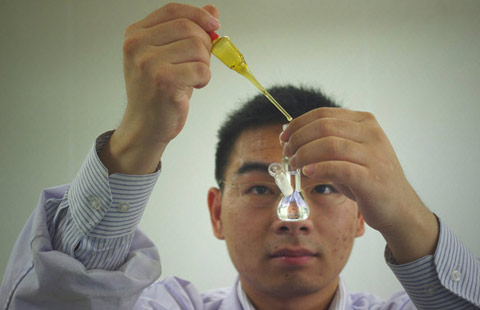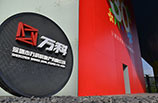Inventor makes good surface impression
By Li Wenfang in Zhuhai, Guangdong (China Daily) Updated: 2015-03-17 10:28Entrepreneur taps into market for unmanned vehicles which aid environmental monitoring
Zhang Yunfei, a ship model fan in his childhood, unexpectedly landed in the nascent market for unmanned surface vehicles.
In his postgraduate study at Hong Kong University of Science and Technology in 2008, Zhang, now 31, chose to work on other types of unmanned vehicles when many were developing drone models in the lab.
His team came up with a USV model. In drawing up a commercial plan for an entrepreneurship contest, they found the world's civilian USV market was largely undeveloped, which prompted the idea for a real enterprise.
When visiting many provinces for market research, a process that took more than half a year, the team got a picture of the huge demand for USVs in the environmental protection and water resources sectors.
Zhang jointly founded Zhuhai Yunzhou Intelligence Technology Ltd in Zhuhai, Guangdong province, in 2010. The company focused on research and development in a low-key way before its first product was launched in 2013.
Environmental protection, including water sampling and water quality monitoring, surveying and mapping, water resources management and floating trash collection are activities expected to create demand for USVs worth 10 billion yuan ($1.6 billion) a year in China, said Zhang, chairman of the company.
"I call it a sunrise industry," he said, identifying the company as the first in the world engaged in the production of USVs for environmental purposes.
Products of Yunzhou are cruising on the 300-square-kilometer Dianchi Lake in Kunming, Yunnan province, for example, where they monitor water quality.
They were also deployed in 2013 to monitor water quality on part of the Hejiang River, which flows from the Guangxi Zhuang autonomous region to Guangdong province. At that time, the river was polluted with cadmium and thallium discharges from a mining company.
In such crisis situations, samples are taken from several spots every half hour, which would be a huge task if done manually, Zhang said.
"Our job is to transform such work, which has long featured low efficiency, weak safety, a heavy workload and boredom."
- Israel requests to join Asian Infrastructure Investment Bank
- Chinese stocks rebound on April 1
- China, the West in Africa: more room for cooperation than competition
- Nanjing cuts taxi franchise fees
- Air China increases flights to Milan, Paris
- JD.com raises delivery charges
- Veteran corporate strategist upbeat about China economy
- L'Oreal China sales revenue up 7.7% in 2014

















